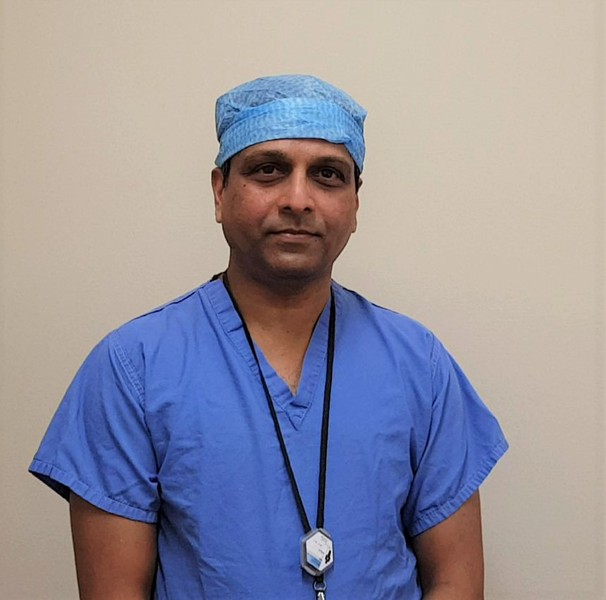Three stroke patients receive pioneering new treatment

THURSDAY, 20 JANUARY, 2022
IMMEDIATE RELEASE:
A video of Dr Sanjay Pillai talking about the thrombectomy service is available at https://youtu.be/MMcTEv6YCbg
Photo attached: Dr Sanjay Pillai, Consultant Interventional Radiologist and Clinical Lead for Thrombectomy Service for the North of Scotland
Three stroke patients receive pioneering new treatment
In the last month, three Tayside stroke patients have received a pioneering treatment and are now recovering well, with two patients able to return home within a week of receiving the treatment.
The message from clinicians leading this new mechanical thrombectomy treatment is don’t delay getting help for a suspected stroke as early treatment can dramatically improve your outcome and reduce the impact of a stroke. The teams have successfully delivered the treatment to three patients in recent weeks.
NHS Tayside introduced a mechanical thrombectomy pilot service in November 2020, which treats stroke patients by physically removing blood clots from blocked arteries in the brain.
The specialist stroke treatment can greatly improve recovery for some patients who have a stroke by reducing disabilities such as paralysis or loss of speech.
The specialist treatment is available for those patients who are clinically eligible and is performed by interventional radiologists, supported by radiographers and the radiology nursing team. Patient care before, during and after the procedure is provided by the stroke, anaesthesia and intensive care unit teams at Ninewells Hospital.
Dr Matt Lambert, NHS Tayside Clinical Lead for Stroke, said, “This treatment can provide a very positive outcome for patients if they receive the treatment early enough. Seeing patients receiving this treatment in Tayside and having fewer problems with disability or returning to their previous ability before their stroke is wonderful.
“After having large strokes, previously people would have been more likely to have died or been left with big deficits in movement and speech. They would also be in hospital for a lot longer receiving rehabilitation and treatment in recovery.
“This treatment means that we can save lives and also reduce the impact of disabilities that a stroke may cause. This service is making a real difference to patients.”
The thrombectomy service in Tayside will be part of a national network of three regional centres along with Glasgow and Edinburgh, which will provide thrombectomy for the West and East of Scotland regions.
Dr Sanjay Pillai, Consultant Interventional Radiologist and Clinical Lead for Thrombectomy Service for the North of Scotland, said, “The whole team has worked hard to launch and continue the pilot service in Tayside and we are encouraged to see more people receiving the treatment and getting a positive outcome.
“For those patients who are suitable to receive thrombectomy, the treatment is most effective in the first few hours after a stroke. Therefore it is really important that anyone who has symptoms of a stroke seeks urgent help by dialling 999 to get treatment as quickly as possible.
“We know that the families of the patients who were treated recently suspected a stroke and called 999 quickly. The paramedic teams who are an integral part of the team helped us to provide the treatment quickly. I can’t emphasise enough that it is a team effort which helps deliver this service.
“People who suspect they may be having a stroke should not wait to ask for help, call for help as soon as you can.”
Symptoms of a stroke
The main symptoms of stroke can be remembered with the word FAST:
Face – the face may have dropped on one side, the person may not be able to smile, or their mouth or eye may have dropped.
Arms - the person with suspected stroke may not be able to lift both arms and keep them there because of weakness or numbness in one arm.
Speech – their speech may be slurred or garbled or the person may not be able to talk at all despite appearing to be awake; they may also have problems understanding what you’re saying to them.
Time – It’s time to call 999 immediately if you see any of these signs or symptoms
Contact:
NHS Tayside Communications
(01382) 424138








